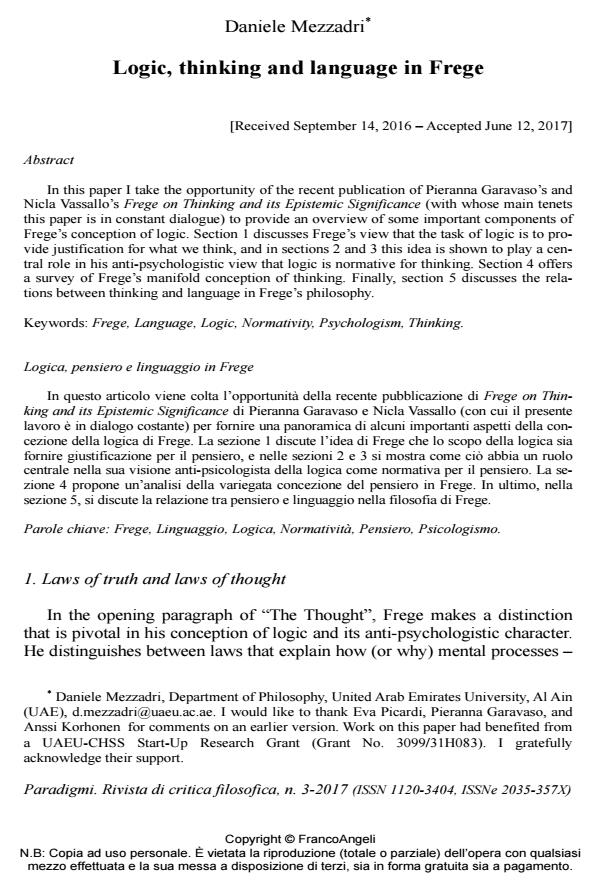Logic, thinking and language in Frege
Titolo Rivista PARADIGMI
Autori/Curatori Daniele Mezzadri
Anno di pubblicazione 2017 Fascicolo 2017/3 Lingua Inglese
Numero pagine 16 P. 165-180 Dimensione file 186 KB
DOI 10.3280/PARA2017-003012
Il DOI è il codice a barre della proprietà intellettuale: per saperne di più
clicca qui
Qui sotto puoi vedere in anteprima la prima pagina di questo articolo.
Se questo articolo ti interessa, lo puoi acquistare (e scaricare in formato pdf) seguendo le facili indicazioni per acquistare il download credit. Acquista Download Credits per scaricare questo Articolo in formato PDF

FrancoAngeli è membro della Publishers International Linking Association, Inc (PILA)associazione indipendente e non profit per facilitare (attraverso i servizi tecnologici implementati da CrossRef.org) l’accesso degli studiosi ai contenuti digitali nelle pubblicazioni professionali e scientifiche
In this paper I take the opportunity of the recent publication of Pieranna Garavaso’s and Nicla Vassallo’s Frege on Thinking and its Epistemic Significance (with whose main tenets this paper is in constant dialogue) to provide an overview of some important components of Frege’s conception of logic. Section 1 discusses Frege’s view that the task of logic is to provide justification for what we think, and in sections 2 and 3 this idea is shown to play a central role in his anti-psychologistic view that logic is normative for thinking. Section 4 offers a survey of Frege’s manifold conception of thinking. Finally, section 5 discusses the relations between thinking and language in Frege’s philosophy.
In questo articolo viene colta l’opportunità della recente pubblicazione di Frege on Thin-king and its Epistemic Significance di Pieranna Garavaso e Nicla Vassallo (con cui il presente lavoro è in dialogo costante) per fornire una panoramica di alcuni importanti aspetti della concezione della logica di Frege. La sezione 1 discute l’idea di Frege che lo scopo della logica sia fornire giustificazione per il pensiero, e nelle sezioni 2 e 3 si mostra come ciò abbia un ruolo centrale nella sua visione anti-psicologista della logica come normativa per il pensiero. La se-zione 4 propone un’analisi della variegata concezione del pensiero in Frege. In ultimo, nella sezione 5, si discute la relazione tra pensiero e linguaggio nella filosofia di Frege.
Keywords:Frege, Linguaggio, Logica, Normatività, Pensiero, Psicologismo.
- Burge T. (1992). Frege on Knowing the Third Realm. Mind, 101, 404: 633-650,
- Burge T. (1998). Frege on Knowing the Foundation. Mind, 107, 426: 305–347,
- Carl W. (1995). Frege’s Theory of Sense and Reference. Its Origins and Scope. Cambridge: Cambridge University Press.
- Dummett M. (1993). Origins of Analytical Philosophy. Cambridge, MA: Harvard University Press.
- Frege G. (1879). Begriffsschrift, eine der arithmetischen nachgebildete Formelsprache des reinen Denkens. Halle: L. Nebert (Engl. transl. Conceptual Notation. A Formula Language of Pure Thought Modelled upon the Formula Language of Arithmetic. In: Conceptual Notation and Related Articles, ed. by T.W. Bynum. Oxford: Clarendon Press, 1972: 101-208.
- Frege G. (1882). Über den wissenschaftliche Berechtigung einer Begriffsschrift. Zeitschrift für Philosophie und philosophischen Kritik, 81: 48-56 (Engl. transl. On the Scientific Justification of a Conceptual Notation. In Conceptual Notation and Related Articles, ed. by T.W. Bynum. Oxford: Clarendon Press, 1972: 83-89.
- Frege G. (1884). Die Grundlagen der Arithmetik, eine logisch mathematische Untersuchung über den Begriff der Zahl. Breslau: Koebner (Engl. transl. The Foundations of Arithmetic. Oxford: Blackwell, 1953).
- Frege G. (1893). Grundgesetze der Arithmetik (Vol. I). Jena: H. Pohle (Partial Engl. transl. The Basic Laws of Arithmetic. Exposition of the System. Berkeley-Los Angeles: University of California Press, 1964).
- Frege G. (1967). Kleine Schriften. Hildesheim: G. Olms (Engl. transl. Collected Papers on Mathematics, Logic and Philosophy. Oxford: Blackwell, 1984).
- Frege G. (1969). Nachgelassene Schriften. Hamburg: Felix Meiner Verlag (Engl. transl. Posthumous Writings. Oxford: Blackwell, 1979).
- Frege G. (1976). Wissenschaftlicher Briefwechsel. Hamburg: Felix Meiner (Engl. transl. Philosophical and Mathematical Correspondence. Oxford: Blackwell, 1980).
- Garavaso P. and Vassallo N. (2014). Frege on Thinking and its Epistemic Significance. Lanham: Lexington Books.
- Haack S. (1978). Philosophy of Logics. Cambridge: Cambridge University Press.
- Hanna R. (1993). Logical Cognition: Husserl's Prolegomena and the Truth in Psychologism. Philosophy and Phenomenological Research, 53, 2: 251-275, DOI: 10.2307/2107768
- Kanterian E. (2012). Frege. A Guide for the Perplexed. London-New York: Continuum.
- Kremer M. (2000). Judgment and Truth in Frege. Journal of the History of Philosophy, 38, 4: 549-581,
- MacFarlane J. (2002). Frege, Kant, and the Logic in Logicism. The Philosophical Review, 111, 1: 25-65, DOI: 10.1215/00318108-111-1-25
- Mezzadri D. (2015). Frege on the Normativity and Constitutivity of Logic for Thought I. Philosophy Compass, 10, 9: 583-591,
- Rein A. (1985). Frege and Natural Language. Philosophy, 60, 234: 513-524, DOI: 10.1017/S0031819100042546
- Scot Rousse B. (2015). Demythologizing the Third Realm: Frege on Grasping Thoughts. Journal for the History of Analytical Philosophy, 3: 1-14,
- Textor M. (2010). Frege on Judging as Acknowledging the Truth. Mind 119, 475: 615-655,
- Wittgenstein L. (1922). Tractatus Logico-Philosophicus. London: Kegan Paul.
Daniele Mezzadri, Logic, thinking and language in Frege in "PARADIGMI" 3/2017, pp 165-180, DOI: 10.3280/PARA2017-003012